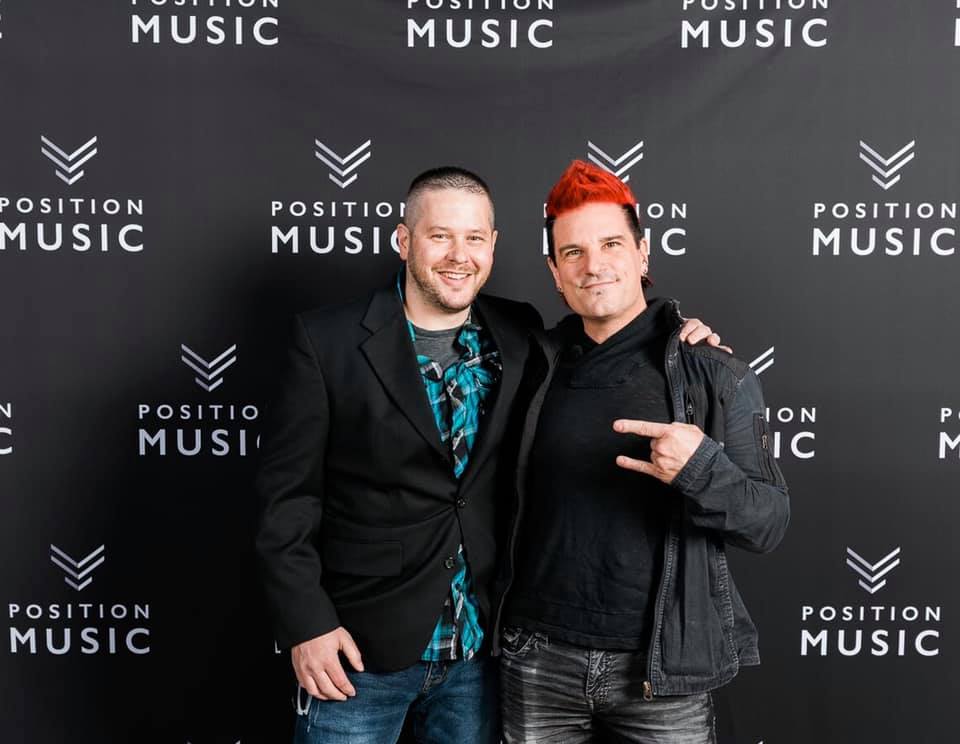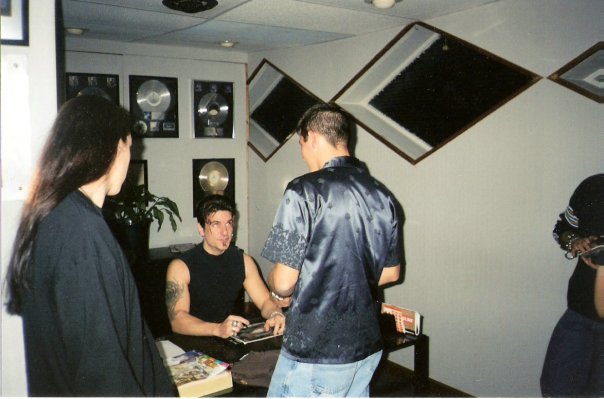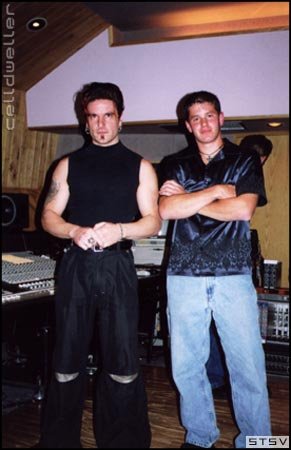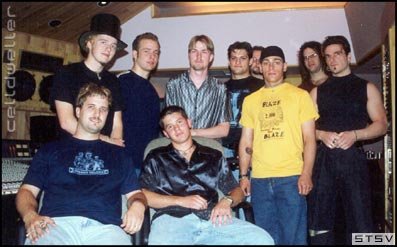
- Can you introduce yourself and tell us about your current role and responsibilities?
My name is James Rhodes. I’m the President of FiXT – we’re an artist-owned, independent record label, music publisher and merchandise company. I co-found the company in 2006 alongside Klayton (Celldweller). My current role as President of the company involves overseeing high level company strategy and decisions, directing our A&R processes, creating our annual budget, and handling all primary business development relationships and deal negotiations. I still work very closely with Klayton and he’s involved in all artist signings and we work together on setting and updating the goalposts of our company vision. In previous years I’ve had as many as 12 people reporting directly to me, but I’m extremely grateful to only have 2 direct reports now – Kurtis Redden, our Director of Operations, Head of Marketing, and Travis Brockett, our Administrative Director. While we’re a small company and there are days where I still wear additional hats, they keep the true day to day operations of the team going where I can focus on bigger picture ideas and projects.
- You said you were a fan of Klayton’s first project Circle Of Dust. Was it love at first listen, or did it take a few tracks to win you over?
I was in middle school at the time and found a cassette in a bargain bin of a store in our local mall. I bought it solely on the artwork (the big cyberpunk eyeball on the cover of the Circle of Dust Brainchild album), but was already a fan of industrial music so it was love at first listen indeed. From there I found the debut, self-titled Circle of Dust album and my fascination deepened even more. But it was the album Disengage a few years later that took Circle of Dust from ‘one of my favorite artists’ to absolutely my favorite artist. From there I knew I had to follow anything Klayton was doing and of course that led to Celldweller and the rest they say, is history.
- Can you describe your first professional interaction with Klayton? Did you play it cool or was it more of an “OMG, I can’t believe this is happening” moment?
I first met Klayton in the Fall of 2000 in a studio in Detroit for the Celldweller Street Team studio visit. This was a transformational experience for me. This was probably the most initiative I’d ever taken to get involved in something. I drove 8 hours from Iowa to Detroit and got to meet some fellow-fans in person, which was amazing in and of itself, but getting to go into a professional studio to meet Klayton and his manager Tyler Bacon who came in from Los Angeles, was like stepping into an alternate reality. I was just a random kid from Iowa and was completely in awe. It was definitely an “I can’t believe this is happening” moment, when I asked Klayton to sign a couple things I brought and one of them was the label, master CD copy of his Circle of Dust Disengage album that he didn’t even know existed. But the icing on the cake was when he answered my question that there was an ‘uncensored’ version of “Deadly Love” that he had never acknowledged anywhere else. A year or so later he sent me a copy of the uncensored version in a package with some other street team promo items and I never shared it with anyone. I could have ripped it and put it online, but by not doing that it was almost an unspoken seed of trust that was planted which later led to future opportunities to work with him.

- Do you still pinch yourself sometimes? (Asking for a friend)
No literal pinching, but I definitely stop and appreciate how amazing it has been to go from fan to employee to co-founder and now president of his label FiXT, as well as become his manager. It has all been possible by being built on a deep level of trust and integrity. As well as patience to allow this to all play out. I think there are people who want everything right now and make it about themselves. I’ve always had a service-oriented mindset and you’d be surprised how far you can go in life building on a foundation of just doing the fundamentals consistently with integrity, service, and patience.
- What was it about his music that resonated with you the most?
It was the unique combination of genres and influences that I’d never heard anyone else quite do as uniquely as Klayton. Circle of Dust started it all with the combination of industrial, electronic and metal elements but with both harsh and melodic vocals and thought provoking lyrics, but then Celldweller took things to a whole new level adding psy-trance, drum & bass, techno, nu-metal, and an even broader alternative and hard rock accessibility. And with all of that, the level of production quality, intricate programming, detailed mixing and sonic ear candy it was at a level few other artists, including artists with budgets 100x bigger were able to pull off with even the bigger producers and mixers in LA, he has had this magical ability to create songs that sound different than anything else out there. And finally, his vocals – the level of vocal production has always fascinated me – his melody and harmony choices, and vocal processing, specifically with the use of vocoders has always been extremely catchy and hooky which underlines that behind all the gear, genre-blending, and production wizardry, Klayton is a world-class songwriter.
- Can you share a memorable experience from your time as a fan? (Bonus points if it involves a wild concert story!)

The first thing that comes to mind as a memorable experience from when I was just a fan (before starting to work with Klayton) was not a direct interaction with him, but fond memories of the Flaming Fish Forum (iykyk) and Cellblock 454 Forums where I spent countless hours chatting with other fans and just nerding out on everything Klayton was working on. As far as a first concert experience, the first concert I ever saw Klayton play live was one that I booked myself to bring Celldweller to play live at Gabe’s Oasis in Iowa City, Iowa. It was only the 2nd public show Celldweller ever performed live and I had a houseful of fans who drove in from all over the country come stay with me the night before and then head up to the show together. The fan community experience was a huge piece in that story as well, but then getting to see Celldweller perform live, 15 feet in front of me was definitely a life changing experience. It was the next step in my journey, towards wanting to be involved directly in the music industry as a career.
- How did your journey from being a fan to working in the music industry begin? Were you already heading in that direction or did you have a ‘eureka!’ moment after becoming a fan?
Volunteering on the Celldweller Street Team was definitely step 1. Then meeting Klayton and his manager Tyler at the Street Team studio visit was step 2. Ordering Celldweller CDs at wholesale rates and reselling them to friends and people in the area was step 3. Booking the Celldweller live show was step 4. Then I thought I wanted to get into studio and mixing work and went to The Recording Workshop in Ohio for a ~3 month intensive, on-site trade-school for audio production. It was on a weekend off from The Recording Workshop that a roommate I was staying with on campus and I drove a few hours away to a Celldweller live show somewhere in Ohio and after the show I went and chatted with Klayton a bit (He knew who I was at that point) but on that particular night he asked me if I wanted to go out to dinner with the band after the show. I let a guy I barely knew take my car and told him to pick me up a couple hours later (this was pre-iPhone and all I had was a cheap tracfone with prepaid minutes if anyone remembers those). That night Klayton asked if I wanted to manage the Street Team. It was my first official opportunity to start working with him. It was still volunteer work but I took it on and started doing everything I could to help – from updating the Celldweller website, to helping draft newsletters, coordinating street team marketing efforts, etc… After continuing to prove myself in that capacity Klayton offered me the opportunity to take over his online e-commerce operations and started paying me a small monthly stipend. That was roughly 20 years ago and we’ve never looked back!
- What were some of the biggest challenges you faced while transitioning from a fan to a professional? Did you have to resist the urge to fangirl/fanboy in meetings? Asking for a friend.
While I was and still am amazed by Klayton’s artistry, and now work with dozens of other amazing artists at FiXT, I’ve always kept things pretty down to earth. At the end of the day we’re all just people and each of us have our struggles. I think part of how I’ve been a good partner and built great relationships with Klayton and the other artists I’ve had the pleasure of working with over the years, is keeping a service-oriented mentality, to just look for the opportunities to add value and help. I think a lot of that comes down to empathy and realizing each artist has their own demons to face, so I want to be beside them so they don’t have to face them alone, or build the trust to where I can handle more and more things for them to try and take things off their plate so they can focus more on their art and the things only they can do.
Working closely with artists, you sometimes see things that nobody else sees. You see how human they are – the challenges, the disappointments and frustrations they go through and I think that can be hard for some fans to actually see. They want to just see them as this idol that is perfect, and I think there can be a lot of judgment from some people thinking these artists should have everything figured out and be a perfect role model all of the time. But again, we’re all human and some fans struggle with seeing the other side of things. So I really try to approach things as non-judgemental as possible and be there to support.
- What were the key steps you took to start your career in the industry?Any embarrassing first-day-on-the-job stories to share?
I had a 2-year community college AA degree and an audio production trade-school certificate, but more than anything else that contributed to getting into the industry, it was passion and work ethic. I knew I didn’t know a lot of things, but applied myself to figure them out because I saw a need and opportunity and wanted to help. I had no special qualifications to do anything that I ultimately ended up doing. And I think that’s one of the key takeaways I’d want anyone who reads this to consider. Don’t wait for someone to say you’re qualified to do whatever you want to do. You may have to volunteer, and not get paid for doing it, but if you make yourself indispensable to a person, company, or cause that you believe in, a path to getting paid for it and career growth will open up. I believe we need less people trying to do something for themselves and more people seeing the opportunities around them to get involved in something they love and help others to succeed, which in turn can bring opportunity and value back to your own path.
I don’t recall any specific embarrassing first day type stories, although I’m sure I made tons of mistakes and did things that I would be embarrassed of – but that’s another lesson I suppose – you need to be ok with making mistakes and having embarrassing moments and realize they are just moments. They don’t define you. Realize you don’t know everything and when you discover something ‘you should have already known’ just take that as the learning experience to add that knowledge now and don’t beat yourself up for it. We all start somewhere and have to learn and grow along the way.
I do recall that in the early days I did a LOT of listening. I had the amazing privilege to observe and listen to Klayton and his manager Tyler for years. I got to sit in on calls, see the emails and hear the stories of what/how/why certain things were happening. If you’re in a position to observe and listen to others with more experience, PAY ATTENTION.
- Are there any specific skills or experiences that you found particularly valuable in your journey?
A few things that come to mind include:
• Look for the opportunities that nobody else sees. That takes time and analysis and a willingness to think differently and consider alternatives to conventional wisdom.
• Take responsibility to develop your own skills – read books, listen to or watch podcasts, watch documentaries, read articles, talk to other people in your industry that have more experience and ask them questions. Talk to people or listen to things outside of your industry – sometimes the best insights come from seeing things from a different perspective.
• Be willing to pick up the phone and call someone or take the time to get on a video call or meet in person if you can.
• Treat everyone with respect and realize that life is long and things come around. An intern at a company you’re doing business with may be the VP or President of a company you’re doing business with 10-15 years from now.
• Protect your reputation and live with integrity. If you take a shortcut or do something questionable, people will talk and everything comes to light eventually. Someone you did business with 3 years ago could be the decision maker in a deal you’re working on in the future and if they don’t trust you because of questionable past behavior, you’ve shot yourself in the foot.
- How has your perspective on the music industry changed since you started working in it? Is it more “sex, drugs, and rock ‘n’ roll” or “spreadsheets, emails, meetings, and then rock ‘n’ roll”?
It has never been sex, drugs, and rock ‘n roll for me or FiXT. In fact, we’ve turned away from working with artists whose motivation was more on the “sex and drugs’ part of that. It’s definitely about the music and the business rather than some ‘rockstar lifestyle’. So based on the choices you’ve given here, it’s “spreadsheets, emails, meetings and then rock ‘n roll’. 🙂

To go a little deeper on that, we want our company (FIXT) and our artist’s careers to be sustainable and long-lived, built on integrity and solid reputation. It gets real complicated, real fast when it’s built on partying. When we’re courting new artists to work with, an element we’re feeling out is how big of an ego and what underlying motivations does the artist/band have. We’ve had tremendously talented artists we could have worked with or continued working with who’d ego, attitude and motivations were a nightmare for our team to deal with and we’ve made the decision that it doesn’t matter how successful something can be, it’s not worth the headaches to deal with toxic people.
- What advice would you give to fans who aspire to work in the music industry? Aside from practicing your “I totally belong here” face?
There are a million paths that you could take, but just from my personal experience, here’s one possibility:
• Look for opportunities to help a specific artist/band (or maybe a record label) that you’re passionate about.
• Be willing to volunteer and show your worth before asking for money.
• Look for the things nobody is doing or that nobody wants to do and do something remarkable with it.
• Be consistent, show up and be reliable. And then be patient for the right timing of next steps.
• Don’t act entitled and have humility.
• Be a life-long learner and keep developing your skills and knowledge.
- What keeps you motivated and passionate about your work today? Aside from caffeine and a good playlist?
The music is always the core. I love hybrid, multi-genre electronic-rock combinations of music with great production and catchy melodies. But it’s the artists themselves and wanting to help them reach their individual goals that really drive me. There’s nothing quite as rewarding as seeing a struggling artist experience exponential growth, helping an artist land their first sync placement in a film, tv show or video game, or landing an artist’s first major editorial playlist or press feature. Even an artist getting their first positive quarterly statement payout. There are multiple artists who’ve worked independently or even with HUGE labels previously, that then worked with FIXT and were blown away when we sent them their first statement with as little as $50. The fact that we send statements and actually pay our artists already sets us apart from a TON of other labels out there.
But I’d be leaving out a lot of what currently motivates me if I didn’t acknowledge that we have big aspirations that we are still on the path towards – which leads to my answer to the next question.
- What are your future goals and plans for the company and your career? World domination, or just getting through the next big project?
While we have artists that reach over a million listeners across all combined global platforms, we have yet to break a million monthly listeners for an individual artist on Spotify and that is THE platform everyone pays attention to. So a big goal on the horizon is getting multiple artists above the 1 million monthly Spotify listener mark, but not to stop there. We want to have multiple roster artists reaching 1-2 million listeners a month but even 3-5 million. Part of our strategy for that is narrowing the # of artists on our roster and investing deeper into each project where we’re making much bigger impacts rather than spreading our resources (time + dollars + effort) across a ton of artists and each only getting a little bump.
We have loft goals for Sync licensing, merch sales, and at some point, a FiXT branded tour. There’s a lot yet to accomplish and build – while we have a great foundation, in many ways we’re still just getting started!
- How do you envision the future of the music industry, and what role do you hope to play in it? Do you see more holograms or perhaps robot musicians, more VR concerts?
I think we’ll continue to see platform shifts, from social platforms to DSP services every 2-3, 3-5 or 5-10 years. Technology (whether that is AI or other innovations we haven’t even conceived of yet) is going to disrupt a lot of what was and we want to always be where consumers are. We were early adopters of streaming, when a lot of the music industry were holding tightly to paid downloads. And streaming gave us HUGE success that has become a significant part of our revenue now. I think as AR/VR become more accessible we’ll see unique content that allows at least super-fans to engage deeper, but I think we’re still a LONG way off from casual fans engaging deeply there. There will have to be a killer app that brings masses to those platforms that I don’t think we’ve seen yet. Music Rhythm games in VR are amazing but I think that’s still a niche of the global audience.
As I look out at the future of how artists and labels work together, I think we’ll see more and more artists thriving independently, but still believe there will be plenty of artists who are looking for the support of a team – whether that is a label or hiring out the own internal team, but one that has the experience, relationships and specialties that an artist needs. At FiXT we bring the services of not just the label, but as a publisher and merch company and we do everything on 50/50 net profit deals. That sets us apart from labels still doing 82/18 or 85/15 deals. We’re artist-owned, artist-friendly and ready to build partnerships into the future.
- How can aspiring music professionals get in touch or learn more about your work?
I’m very accessible – james@fixtmusic.com, or find me on Facebook, Instagram, LinkedIn or Twitter and message me on your platform of choice. 🙂
- Mandatory – Contractually obligated to ask: And now the most important question of them all! Which would you rather fight: one horse-sized duck or a hundred duck-sized horses?
100 Duck-sized horses! Somehow that feels like the odds are greater to survive and not all 100 could actually be fighting you at the same time!
For more information on FiXT, visit: www.fixtmusic.com.